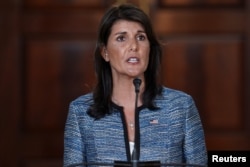The Trump administration's announcement Tuesday that it is withdrawing from the U.N. Human Rights Council has created a vacuum that China may like to fill, threatening the serious work of the body.
Although the U.S. criticized the council for its focus on Israel and the membership of some countries who are rights abusers, the 47-member Human Rights Council does play an important role in the promotion and protection of global human rights.
"It has produced good and strong reports into war crimes and other grave abuses. Particularly, its reports on Syria, North Korea, Iran, Sri Lanka and Burma/Myanmar have been really important ones," one senior Western diplomat said.
The council also has held special sessions looking into the situation of Rohingya Muslims fleeing Myanmar and the recent government siege of the Syrian town of Eastern Ghouta.
WATCH: US Under Fire for Abandoning UN Human Rights Council
"Of course, it is not perfect, but we believe it is a strong tool," the Western diplomat said.
The U.S. is not incorrect in saying that some of the members on the council are among the worst rights abusers in the world. China, Venezuela, Saudi Arabia and Egypt stand out.
China ascendant?
But some observers worry that the U.S.'s early departure — its three-year term ends in 2019 — will undermine the council's work and open the door to a powerful country like China, steering it with no United States to act as a bulwark.
"We are afraid that, in a way, it could be handing the keys of the Human Rights Council to the likes of the Chinas and the Saudi Arabias, and that would not be a good thing," said Louis Charbonneau, U.N. director for Human Rights Watch. "They [the Chinese] do have a lot of stature and influence, and countries are often afraid to cross China."
"The Chinese have started to promote their own state-centric approach to human rights through the council, and they will find it even easier now that the U.S. is out of the way," said Richard Gowan, a fellow at the European Council on Foreign Relations and a U.N. analyst.
The Human Rights Council was created in 2006 to replace the dysfunctional U.N. Human Rights Commission, which was disbanded. The administration of George W. Bush opted against seeking membership, and the U.S. did not join until 2009 under President Barack Obama, saying it sought to improve the council by working from within it.
Lose-lose
"America leaving will weaken us, I'm afraid, and give strength to those countries which take a very different view of human rights from the way we think about it," the Western diplomat said.
"While this is basically gesture politics, it will hurt both the Human Rights Council and U.S. prestige at the U.N.," analyst Gowan said. "It is going to get harder for [U.S. Ambassador Nikki] Haley to persuade other diplomats that they can trust the U.S. at the U.N."
Under the administration of President Donald Trump, the U.S. has pulled out of the Paris climate accord and the Iran nuclear deal. It also has announced plans to withdraw at the end of 2018 from the U.N.'s Educational, Scientific and Cultural Organization, citing its "continuing anti-Israel bias"; has cut its contributions this year by 80 percent to UNRWA, the agency that assists Palestinian refugees; and has slashed funding for the U.N. Population Fund.
"There's a mounting sense that the administration is not willing to talk about multilateral issues in good faith," Gowan added.
Withdrawal from the council also will not protect the U.S. from criticism about its own human rights record. It will continue to be subject to the Universal Periodic Review (UPR), which involves an assessment of the human rights records of all U.N. member states.







